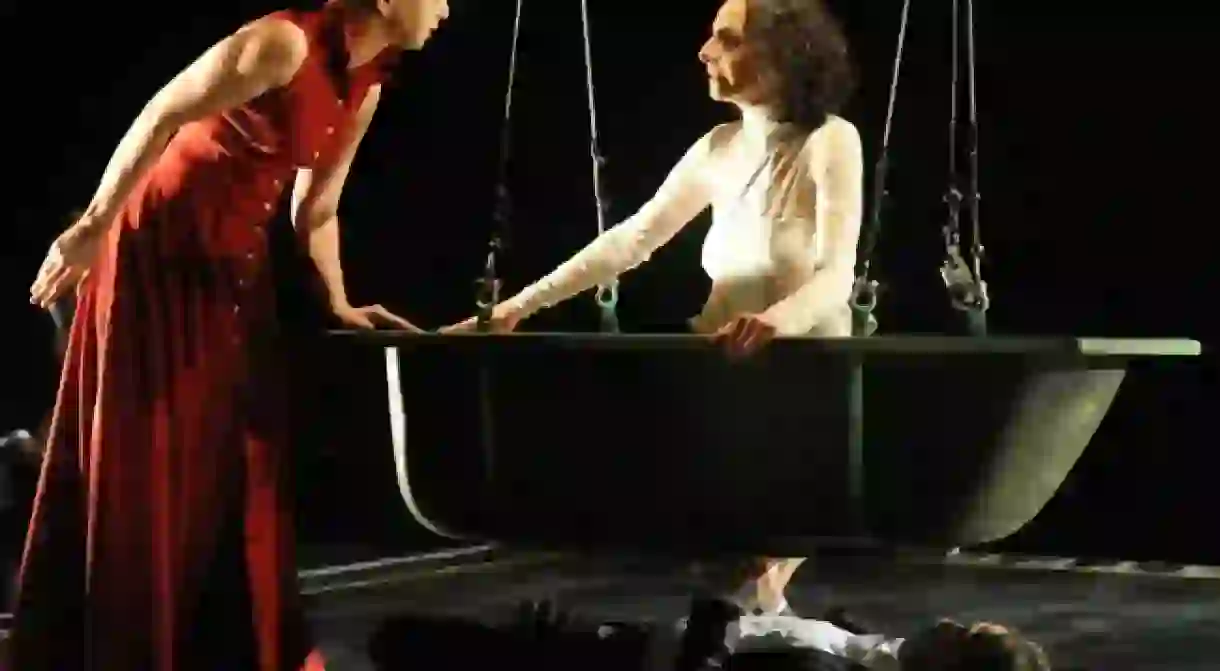The Theater Lover's Guide To Tel Aviv

Theater in Tel Aviv is extremely popular and enjoyed by many Israelis and tourists. It’s an active scene filled with numerous talented actors and playwrights. More recently diverse companies have toured internationally and are creating a unique Israeli stage-language. Discover the marvellous world of theater on the Tel Aviv stage.

HaBima
Theater

Teatron Habima (‘the stage theater’) – is one of the oldest and one of the first Hebrew language theaters in Israel. The theater was founded in Vilnius in 1912, but its founder, Nahum David Tzemach, had to close it due to financial issues. Later Nahum asked Konstantin Stanislavsky, eminent Russian actor, to create the Hebrew-speaking theater in Russia. Under the rule of Yevgeny Vakhtangov the theater was first created in 1917. The first performance took place in 1928. The construction of theater building in Tel-Aviv was finished in 1946.
Gesher
Theater

Gesher (‘bridge’) Theater was founded by Russian immigrants in 1991. A small group of young actors led by their teacher Yevgeny Aryeh came to Israel in 1990. Actors from Moscow, St-Petersburg and Riga joined the group and together they have created the Bridge between countries – the Gesher Theater. Around 400,000 Russian-speakers lived in Israel at that point. However, the theater put on the plays in Russian and in Hebrew with two performances for each play. Nowadays, Russian and European classics are staged only in Hebrew with Russian subtitles. The Gesher Theater won the Israel Prize in 1997.
Cameri
Theater

One of the leading theaters in Israel, the Cameri Theater was established in 1944. It is the Municipal Theater of Tel Aviv, which is involved in several social action programs. Cameri stages up to 10 new productions each year together with their performances from the previous years. Each performance is translated into English, Russian and Arabic on the spot. The director of Camei – Noam Semel – has also founded the Institute of Israeli Drama, which promotes Israeli theaters around the world. The Cameri Theater is housed at the Tel Aviv Performing Arts Center.
Karov Theater
Theater

Karov Theater was founded in 2001. Its director, Niko Nitay, aims to bring the experimental Israeli drama to the mainstream and to popularize classical theater. Staging more than 100 performances each year, Karov Theater is also taking part in numerous educational art projects for students and people with special needs. Together with the wide range of performances, from the classics to the modern projects, the theater offers professional acting courses for amateur actors. The friendly atmosphere and talented teachers help people of all ages to feel confident on stage.
Yiddishpiel
Theater

Yiddishpiel is the only Yiddish theater in Israel. It was established in 1987 by Shmuel Atzmon-Wircer. The aim of the Yiddishpiel is to restore the Yiddish language in all is charm and glory. The theater, which earned international recognition, has created more than 100 plays. Notable Yiddish actors play together with young immigrants from the former Soviet Union and Europe, while guest-actors from all over the world are also invited. The repertoire of the Yiddishpiel ranges from classic works of Sholem Asch to completely new and modern productions. The theater also holds various activities to contribute and support the community and to preservethe Yiddish language.
HaSimta
Theater

HaSimta (‘the alleyway’) Theater is the oldest fringe theater of Israel. Nestled in the center of Old Jaffa, it was open more than 25 years ago. HaSimta attracts artists who wish to explore theatrical form and expression ‘out-of-the-box’. Numerous festivals originated in this theater, including the Israeli Spring – the outstanding festival which explores Israeli identity. HaSimta Theater also offers novice Israeli playwrights the chance to gain recognition in the annual summer festival named The Week of Original Theater.
Jaffa Theater
Theater

The Arab Hebrew Theater is a stage for Arab Hebrew culture, founded in 1998. The theater is located in a multi-arched building in Old Jaffa, which faces the sea. Jaffa Theater is unique in its style: there are two theater companies working together and independently. Arab and Jewish artists are able to generate an exclusive theatrical language involving the challenging space of old Jaffa building. Focusing on Middle East culture, they have created a remarkable institution in the theater world in terms of social involvement. Four annual festivals are held in the Arab Hebrew Theater.
The Tmuna Theater
Theater
The Tmuna Theater was founded in 1987 by Nava Tzukerman. In its early years the theater was a place for fringe productions. In 1999, The Tmuna Theater developed into a multidisciplinary centre for dance, music, literature and fine art. In addition, the theater is a community and performance theater, featuring acts that veer towards the fringe and avant garde. More than 550 theatre shows, around 80 dance acts, 50 literature and poetry nights and over 270 music events are held in The Tmuna Theater every year.
By Maria Shchelkunova
Maria is originally from Saint Petersburg, Russia. She came to Tel Aviv in 2009 for the first time and fell in love with the city from the first glance. After four years, Maria moved to Israel as an engineer student at Tel Aviv University and is not going to leave Israel.
By Maria Shchelkunova
Maria is originally from Saint Petersburg, Russia. She came to Tel Aviv in 2009 for the first time and fell in love with the city from the first glance. After four years, Maria moved to Israel as an engineer student at Tel Aviv University and is not going to leave Israel.













